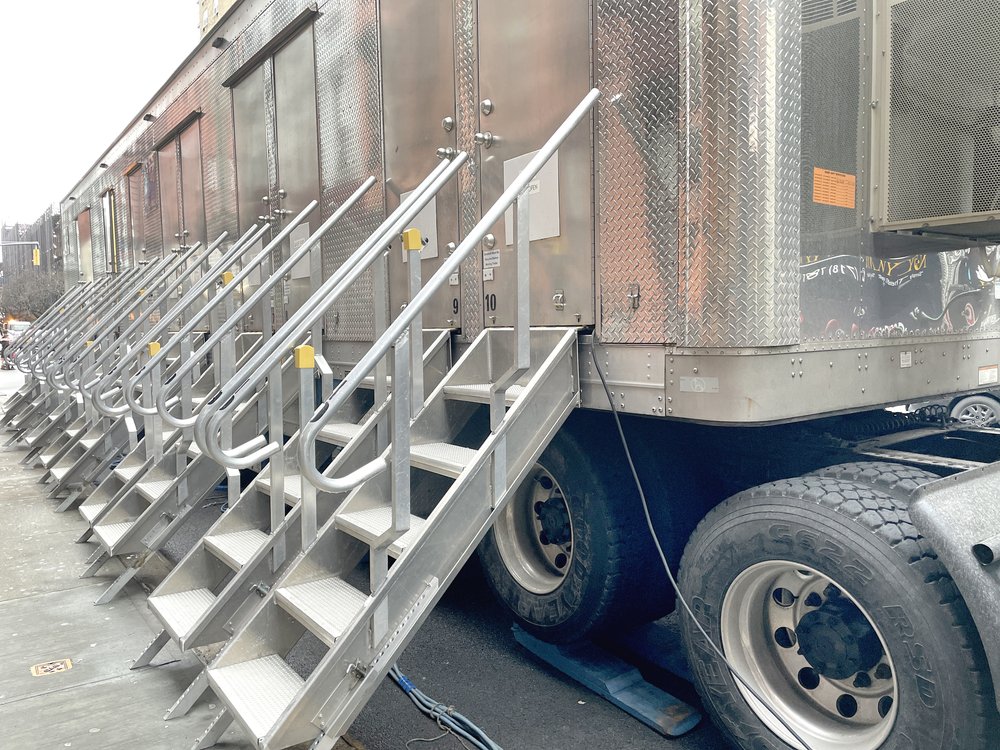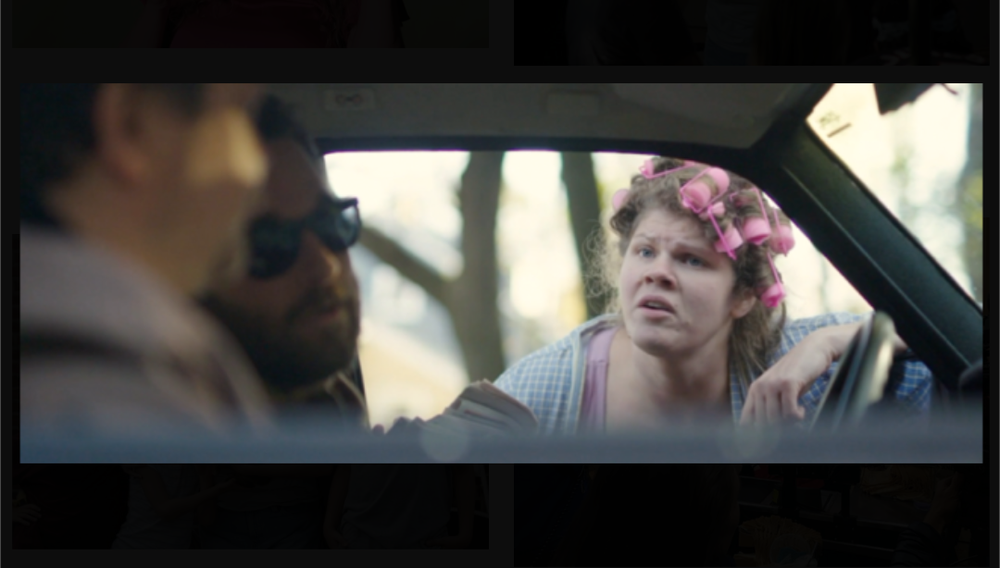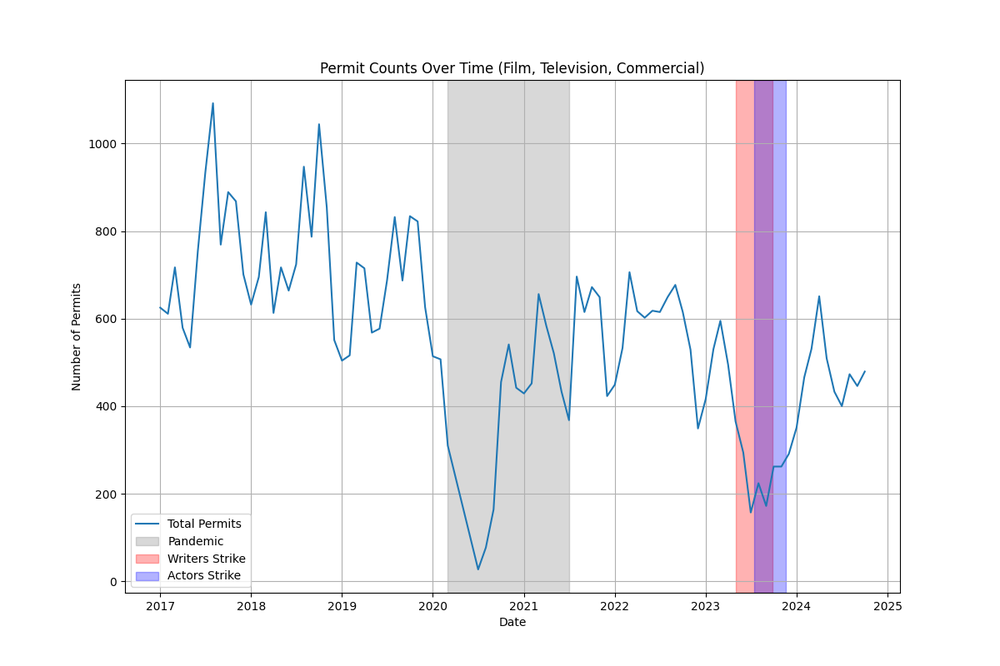NYC's film industry is still 'totally dead' a year after the strikes — at least for some
Dec. 5, 2024, 12:01 p.m.
A year after the strike, production still has yet to return to pre-pandemic levels.

A year after the writers’ and actors’ strikes that stalled the film and television industry, production activity in New York City remains stuck in low gear, according to city data and interviews with more than a dozen local actors, writers, executives and crew members.
“It’s been totally dead,” said Max Casella, a series regular on “The Sopranos,” “Marvelous Mrs. Maisel,” and other shows. “Nothing going on, no work, nothing.”
“There are just so many fewer ways to make a living in this industry now than ever,” said Nivedita Kulkarni, a comedian and actress with a 14-year career.
The past several years have been enormously challenging for many New Yorkers in the industry. First there were the pandemic shutdowns, which brought production to a halt. Then, there were the strikes that began in May 2023.
Nearly all the workers interviewed for this story described a dead summer and fall with few auditions and little work. In some cases, actors used to starring scenes have taken diminished roles, and minor actors or co-stars have taken work as background actors or extras.

Some have turned to trading cryptocurrencies and others have left the city altogether, no longer seeing it as a place where they might build a career in the industry.
“It’s not just a New York City shift, it’s an industry shift. It’s a national shift,” said Pat Kaufman, commissioner of the Mayor’s Office of Media and Entertainment.
Industry experts and sources expect the downturn to last several years at minimum, following larger changes in the entertainment industry’s business model. Many predict that New York City will likely remain a domestic production hotspot, but it may take years for employment to return to pre-pandemic levels.
'We are the luxury brand'
After a period of rapid expansion as networks and studios launched new streaming services and produced shows to fill them with, the industry has now turned to belt-tightening. Disney has cut $7.5 billion in spending in the past few years, Netflix cracked down on password-sharing, and multiple streaming services have raised prices and introduced ads.
The industry has also been consolidating amid these changes: Warner Brothers’ 2022 merger with Discovery and Skydance Media’s 2024 deal to purchase Paramount Global both signal that further reductions in staff and costs are on the horizon.
Across the country, production was down by 35% in the third quarter of this year as compared to the same period in 2022, according to the production data platform ProdPro.
Film activity in New York has picked up since the depths of the strikes, but has not returned to pre-pandemic levels, Kaufman said.

Location shooting permits issued for film, television, and commercial projects in NYC, which serve as a general proxy for industry-wide activity, are down 22% for the year through November compared to the same period in 2022 (before the strikes). They are down 43% from that period in 2019 (before the pandemic), according to city data obtained by Gothamist.
The data does not capture shooting activity on private soundstages. But operators of such facilities describe a similar downturn.
“We were very busy [before the strikes] and now we’re not,” said Hal Rosenbluth, president of Kaufman Astoria Studios, where films like “The Irishman” and shows including “Succession” and “Sesame Street” were shot. “We’re far from capacity.”
Kaufman believes New York City will weather the slowdown due to the state’s generous tax credit for production companies that film here, the expanding roster of soundstages for filming in and around the city, and the unique commodity of New York City as a filming location.
“We are the luxury brand,” Kaufman said. “We’ve got the backdrops, the skylines, the iconic locations, and that will always work in our favor.”
‘I don’t know what I would even qualify for’
Brooke Hoover – an actress who has worked consistently in co-starring or background roles on shows like “Blue Bloods,” “FBI” and “High Maintenance” since 2010 – said that before the strikes, she did perhaps 50 auditions a year for speaking roles.
This year she’s done around 20, with the bulk of them for commercials instead of films or TV shows.
Hoover, 43, has begun exploring options like returning to school for interior design, working behind the camera in set design, or taking an office temp job. She cleans homes part-time to make ends meet. Hoover has always had side jobs, but said that until now, her acting work was always enough to pay her bills, health insurance and mortgage.
“At this point, at my age and skill level, I don’t know what I would even qualify for,” Hoover said.
Kulkarni said this is the first time in her 14-year career that almost everyone she knows is unemployed.
In 2014, Kulkarni founded a networking platform for women in the entertainment industry called Nuva. This year, Nuva launched a “job search club” of roughly 30 women who meet every week or two to help each other find work.
“I started trading crypto because that’s the only thing that makes money in this climate,” Kulkarni said. She described friends who have left the industry in recent months to become teachers or camp counselors, or to attend graduate school in an unrelated field. Others who are booking occasional paid acting or writing work are holding down two to three part-time side jobs, she said.
“I think the only writers and actors who can really do this are the ones who are privileged enough that they don’t need to make a living from it,” she said.
New York Public Radio has a contract with SAG-AFTRA, but our staff belongs to a different branch from the actors and was not involved in the strike.
16 ideas for holiday gifts that scream New York City This private upstate New York island could be yours for just $700K